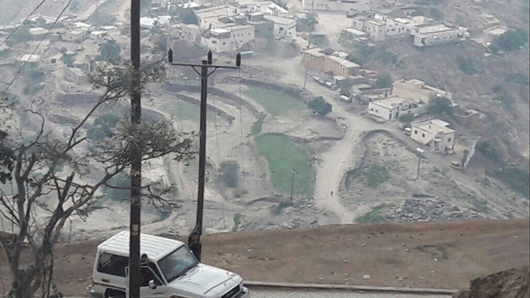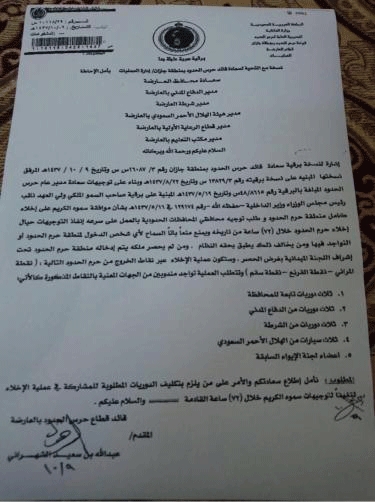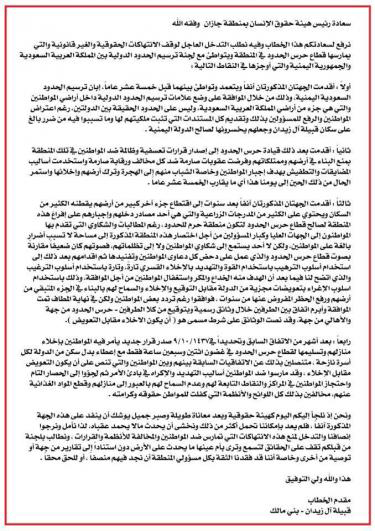
The Observers
A Saudi activist filmed arguments between members of tribes living in southern Saudi Arabia and a guard at a checkpoint in Jizan, a village near the border between Saudi Arabia and Yemen. Saudi authorities deem the zone around Jizan dangerous and want to evacuate the village. However, the residents are refusing to budge.
A video posted online showed men from the village of Jizane being stopped at a roadblock manned by border guards. An older man from Jizan steps forward. He tells the border police that it is the locals’ right to return to their village and stay there if they so desire.
A second video shows the same older man sitting inside a border post, speaking to an officer, who is listening to him intently. The old man from Jizan is trying to convince the officer that the village does not need to be evacuated.
Suddenly, the officer realizes that he is being filmed by one of the other people from Jizan. He orders him to stop recording.
The online news site Sabq quoted Mohammed Shamrani, the governor of Aldair Bani Malik, located in the region of Jizan, who said that the evacuation orders had come from higher up - in other words, likely from the interior ministry. Several villages in the border zone with Yemen have already been evacuated.
 |
We received the evacuation orders on July 14. We had 72 hours to leave the zone. We refused to comply with this order because the area where we live is safe. We negotiated non-aggression agreements with the Yemeni tribes who live on the other side of the border years ago. The Houthis respect these treaties.

This evacuation order, commanded by the emir, was signed by the chief of the border guards stationed in al-Arada. This document was shared with us by our Observer.
This evacuation order, commanded by the emir, was signed by the chief of the border guards stationed in al-Arada.
We will refuse to evacuate until the end unless the King of Saudi Arabia orders us directly. These videos show our determination. It can get tense quickly during interactions between locals and the border police, but for good reason.
They are constantly seeking ways to force us to evacuate. On that particular day, they blocked the road as we were returning from the market. We were stuck there, unable to return home. It was only after several hours that they finally let us continue on our way.
Our tribes make a living by farming; if we are separated from our land, we are left without resources. No compensation has been offered to us for evacuating. Other neighboring tribes recently agreed to evacuate in exchange for financial compensation but they haven’t been paid, so we’re wary.

Recently, members of the al-Zidane tribe demanded that the border police stop infringing upon their rights. They have also filed complaints over longstanding laws, for example, one that bans them from building on their own land.
Recently, members of the al-Zidane tribe demanded that the border police stop infringing upon their rights. They have also filed complaints over longstanding laws, for example, one that bans them from building on their own land.
We contacted the governor of Jizan about this issue but he threatened to evacuate us by force. It’s the same with the emir. Last Tuesday, he ordered the border police to evacuate us immediately, with no further delay, but they haven’t yet done so.
The Saudi press gives little coverage to these evacuations. However, there has been more coverage in foreign media, especially in Yemen. There are also some Saudi activists who are talking about the issue on Twitter.
It isn’t the first time that our rights have been violated. Our tribes are related to Yemeni tribes, which are located on the other side of the border. We were split up by the arbitrary national borders drawn through this area. For many years, we have been discriminated against. We have little access to public services and we are marginalized both socially and politically. Saudi authorities regularly go after activists who protest against their policies in the south of the country.
About 800 of us were evacuated from our village. The authorities promised us financial compensation. They also promised to house us elsewhere in Jizan province. They even set up a commission to take an inventory of all the villagers’ belongings.
However, people from my village and a few neighboring villages were evacuated more than a month ago and, so far, we haven’t received a single cent from the government. Most of the people from my village are farmers who grow crops and raise livestock. Some of them were forced to sell their flock to feed their families. Everyone is getting by the best that he or she can.
The evacuated families went to live in neighboring villages. Because many people have large families, they are often split up between several relatives, sometimes living in different towns.
I don’t contest the authorities’ decision to evacuate but I don’t understand why they didn’t provide housing or financial compensation before evacuating these villages.
According to Laurent Bonnefoy, a political analyst who is an expert on Yemen, the tensions between these tribes and the Saudi state go back to the 1930s.
In 1934, Saudi Arabia annexed three provinces that belonged to Yemen: Jizan, Najran, and Asir. Suddenly, Yemeni tribes living in those areas found themselves living in Saudi Arabia. Some even found themselves straddling the border. This charged history has generated tensions between Saudi authorities and tribes living in the border regions.
These tensions were at least partially caused by the marginalization and the lack of development projects in the region. Many of the tribes who live on the border are followers of Isma’ilism, a branch of Shiia Islam [Editor’s Note: In Jizan, however, most of the tribes follow Sunni Islam]. Saudi authorities are afraid that these religious similarities may lead them to sympathise with the Houthis.
Source: France24, Edited by Website Team